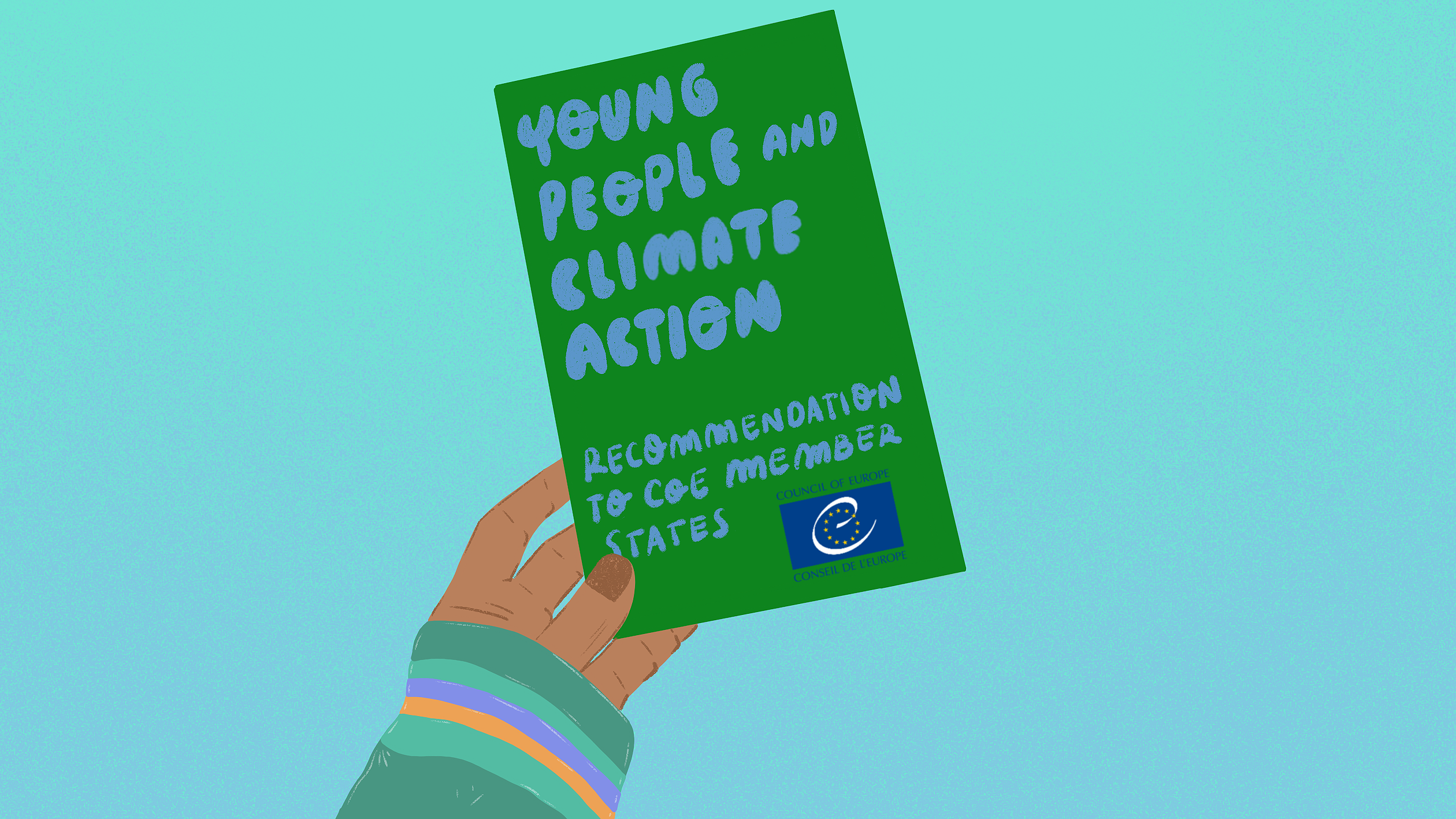
Illustration by Daniela Nunes
Young people and climate action
A recommendation to the Council of Europe member states
by Eimear Manning
 An urgency for action
An urgency for action
Young people are spearheading the global movement for action on the climate crisis. With organisations such as Fridays for Future and Extinction Rebellion being established with youth at the helm, it’s clear that addressing global greenhouse gas emissions is on the agenda, particularly for those aged 30 or younger. After all, young populations and future generations who have yet to be born will have to suffer the adverse consequences of climate disaster longer than anyone else alive on the planet today.
Many young people are disillusioned with the response from governments, from local to international levels. As such, a rise in environmental protests has been observed, particularly regarding new disruptive forms of non-violent actions. Viral social media posts show young climate activists across Europe throwing soup at famous paintings; tying themselves to goalposts at major sporting events; blocking airport runways; and gluing themselves to roads – all with the goal of raising awareness to the urgent need for fast, meaningful and tangible climate action.
Yet, many of the demands of these environmental defenders are met with stigmatisation and criminalisation (Council of Europe), and are often confronted with repressive action such as arrest, detention and physical assault resulting in injuries by police and members of the public (The Guardian). In several European countries, non-violent climate protesters have been imprisoned (EuroNews; Reuters; AP News), and in Australia and the UK some have even been handed non-parole periods with their sentencing (ABC News; BBC News).
The disproportionate response to climate activists infringes on the human right to freedom of peaceful assembly and freedom of expression, which is a cornerstone of democracy. It is for this reason that the Council of Europe youth sector decided to focus on ensuring that the voice of climate activists can be heard, and heard without unwarranted repercussions.
 Creating change
Creating change
The Council of Europe is the continent’s leading human rights organisation within which intergovernmental committees, composed of government experts nominated by the member states, advise on policies. The threat to young people’s human rights posed by the climate urgency was recognised by the Advisory Council on Youth, which – contrary to the other intergovernmental committees – is composed of young representatives of non-governmental youth organisations. The Joint Council on Youth, which is where the Advisory Council works hand in hand with government officials who form the European Steering Committee for Youth, created a task force to identify how the Council of Europe could respond to the needs of young climate defenders, striving for cohesion in climate actions across Europe. The task force identified the climate crisis, but especially young climate activists’ rights and meaningful participation in climate-related decision making, as a serious area of concern for young people, and thus decided to establish a Drafting Group to develop a Committee of Ministers recommendation on the topic of young people and climate action.
Creating a recommendation is a substantial decision, as the Committee of Ministers is the main decision-making body of the Council of Europe, and they detail recommendations for the 46 member states on matters that concern human rights, democracy or the rule of law. A recommendation is not legally binding, however, it provides proposals and policy frameworks that governments can, should, and are strongly encouraged to implement at national level.
The Drafting Group for the recommendation on young people and climate action was established in February 2023, and comprises two members of the Advisory Council on Youth, two from the European Steering Committee for Youth, and one from the European Youth Forum, which ensure that expertise on both youth and climate action are included, to ensure a joint, interdisciplinary and intergenerational effort.
To assist the Drafting Group in identifying possible content for the recommendation, a consultative meeting, which brought together 19 diverse young climate activists was organised. Through brainstorming the intersection between young people and the climate crisis, a series of common themes began to evolve:
- youth participation;
- youth work;
- access to information and education;
- emotional and psychological well-being;
- rights to freedom of expression, association and assembly;
- discrimination.
After identifying these themes, space was given to the consultation participants to exchange experiences, practices and ideas on youth participation in climate-related activities and the effects of the climate crisis on young people. Care was taken to ensure that during consultative discussions the diverse needs, circumstances and aspirations of young people – especially climate activists and environmental defenders – were accounted for. This information was then utilised by the Drafting Group to create the first draft text of the Committee of Ministers recommendation on young people and climate action.
 Support at the summit
Support at the summit
In May 2023, the 4th Summit of the Council of Europe Heads of State and Government was held in Iceland, and resulted in the adoption of the Reykjavík Declaration – United around our values. The declaration supports the vital role of civil society, especially youth, in the protection of the environment, as it highlights “the urgency of additional efforts to protect the environment, as well as to counter the impact of the triple planetary crisis of pollution, climate change and loss of biodiversity on human rights, democracy and the rule of law” (Reykjavík Declaration, 2023).
The Heads of State and Government outlined their commitment to strengthening their work on the human rights aspects of the environment and the work of the Council of Europe, affirming that “a clean, healthy and sustainable environment is integral to the full enjoyment of human rights by present and future generations” (Reykjavík Declaration, 2023). In addition, they committed to increased transparency and co-operation with young people, and including youth participation in decision-making processes.
The adoption of the Reykjavík Declaration was a vital encouragement to the Drafting Group that their recommendation aligns with the new visions of the Council of Europe and its member states.
 The recommendation
The recommendation
The aim of the recommendation is to address the challenges all young people, and in particular youth climate activists, face especially when advocating for a healthy, clean and sustainable environment. The recommendation includes seven key areas, and encourages member states to do the following within those areas:
- Ensuring young people’s access to rights: Safeguard the rights of all young people who are protesting climate inaction, particularly with regards to ensuring that equitable and proportionate legal means are used in procedures that may have arisen from their protest;
- Strengthening youth participation: Ensure meaningful and accessible youth participation in climate-related decision-making processes;
- Investing in green jobs, education and green skills: Allocate essential resources to develop green jobs and opportunities for young people;
- Investing in tailored support to youth workers: Recognise the importance of youth work, youth organisations and national youth councils in assisting young people to acquire the knowledge, skills, values and attitudes for their engagement with climate action;
- Ensuring access to healthcare and targeted youth services: Address shortcomings in the provision of youth-friendly mental health services, especially the lack of knowledge on the phenomenon of eco-anxiety;
- Accessing information and the right to be informed: Ensure young people have access to reliable climate-related information, including in accessible and youth-friendly formats, as well as in minority languages;
- Addressing discrimination and intergenerational equity: Address all forms of discrimination, especially racism and gender inequality which are strongly intertwined with the climate crisis, and promote intergenerational solidarity and equity, as well as climate justice.
 The adoption process
The adoption process
In Autumn 2023, the recommendation will be examined by the Joint Council on Youth and, if adopted, submitted to the Committee of Ministers for final negotiations and adoption. If the Committee of Ministers agrees to the Drafting Group’s proposal, after adoption the recommendation will be reviewed every five years. The Joint Council on Youth will assess the progress made within each member state and will provide suggestions for further implementations that could continue to strengthen this progress.
 Next steps
Next steps
If adopted, it will be imperative that everyone gives the recommendation on young people and climate action as much visibility as possible. The greater the external interest for this recommendation, and the stronger its implementation is pushed from external shareholders, the better the outcomes will be. We’re calling on you to highlight the need for greater policy implementation around young people and climate action. Share the recommendation with your local politicians and ministries, and explain why the adoption and implementation of such a recommendation is important to both current and future generations.
You can keep up to date with the recommendation’s progress at the Council of Europe Youth Department's website.
Below are some additional links that may be of interest to those who wish to better their understanding of the Council of Europe’s work on climate, nature and biodiversity:
- Human rights and the environment in the Council of Europe: Environment and Human Rights (CDDH-ENV) – Human Rights Intergovernmental Cooperation (coe.int)
- Conservation of wildlife and natural habitats in the Council of Europe: Convention on the conservation of European wildlife and natural habitats (Bern Convention) – Convention on the Conservation of European Wildlife and Natural Habitats (coe.int)
- Protection of landscapes: Council of Europe Landscape Convention/ Official website – Council of Europe Landscape Convention (coe.int)

Eimear sits on a Drafting Group developing a Council of Europe recommendation on young people and climate action.


